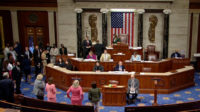Manufacturing
US Prioritizes Projects Complete by 2030 for CHIPS Act Funding, Says Commerce Sec
Aim is to vastly increase nation's share of high-end semiconductor global production by end of decade

The U.S. Dept. of Commerce is prioritizing semiconductor chip plant projects that will be completed by 2030 as it considers hundreds of applications from manufacturers seeking part of $39 billion from 2022’s CHIPS and Science Act allocated for incentives toward plant construction, according to U.S. Commerce Secretary Gina Raimondo.
Raimondo, speaking Feb. 26 at the Center for Strategic and International Studies in Washington, said her department had received more than 600 statements of interest from companies seeking some of the money, but most will not receive any of it. With a finite amount of money available and “urgent national security goals,” she said that officials made the decision to prioritize those projects that will be completed sooner.
“I want to be clear, there are many worthy proposals that we’ve received with plans to come online after 2030,” Raimondo said. “And we’re saying ‘no,’ for now, to those projects, because we want to maximize our impact in this decade. It’s not responsible to give money to a project that will come online 10 or 12 years from now if it means saying ‘no’ to excellent projects that could come online this year.”
Since releasing a notice of funding opportunity last year, the Commerce Dept. has received more than 160 complete applications for funding of both projects worth more than $300 million and projects worth less than $300 million. Raimondo said officials planned to put about $28 billion of the CHIPS Act funding toward projects that will manufacture “leading edge” chips used in the development of artificial intelligence. But those leading-edge chip makers alone have requested more than $70 billion.
The goal is to get the U.S. from its total lack of domestic production for leading edge logic chips today to producing about 20% of the world’s supply of the chips by the end of the decade, according to Raimondo.
The Biden administration has framed domestic semiconductor manufacturing as a key issue for both the economy and national security. Chip supply chain issues impacted the production of some goods during the height of the COVID-19 pandemic, and the chips have widespread applications that include military equipment.
“Our job is to make targeted investments in relentless pursuit of achieving our national security objectives,” Raimondo said.
Since the launch of the program, Raimondo said the private sector has announced $200 billion in semiconductor manufacturing investments. Nine states have also created economic development programs targeting the semiconductor sector to provide matching funding.
Commerce Dept. officials have already reached preliminary agreements with three companies to provide them with CHIPS Act funding. The largest award so far is $1.5 billion announced this month for three GlobalFoundries projects in New York and Vermont. Smaller amounts of money have also been set for BAE Systems Inc. and Microchip Technology Inc.





